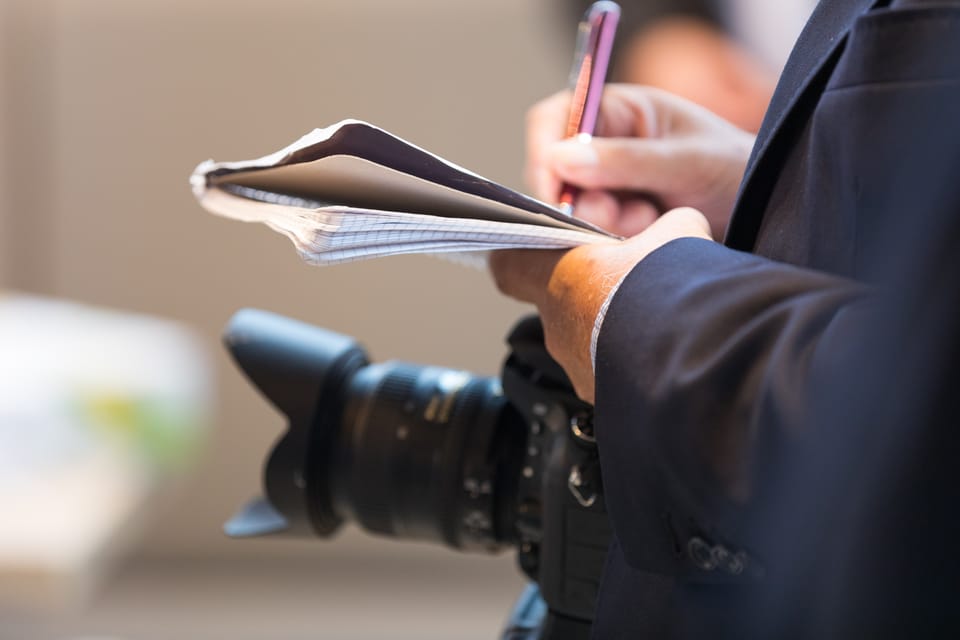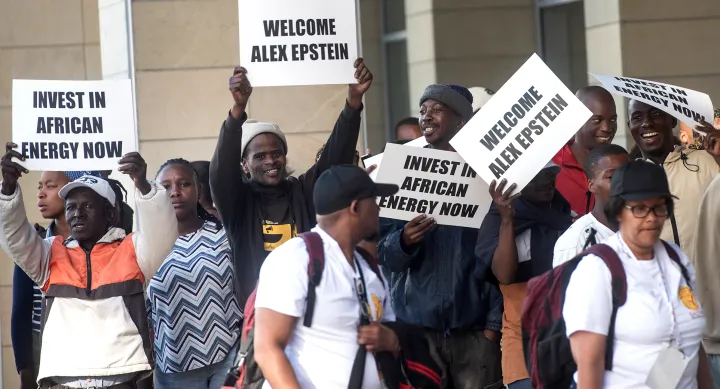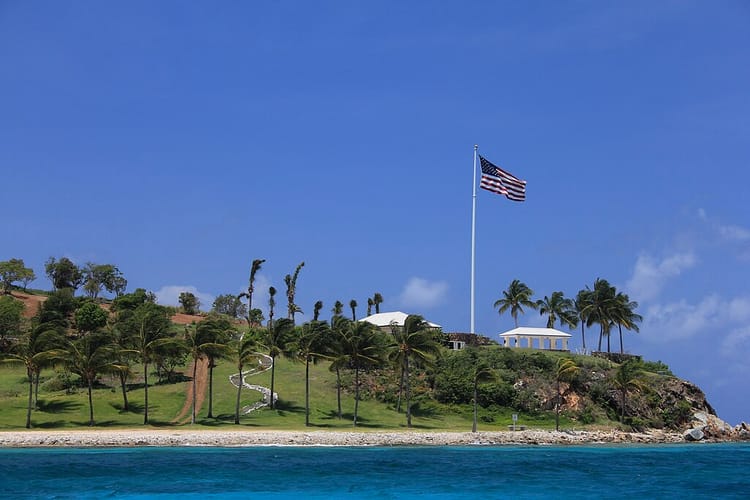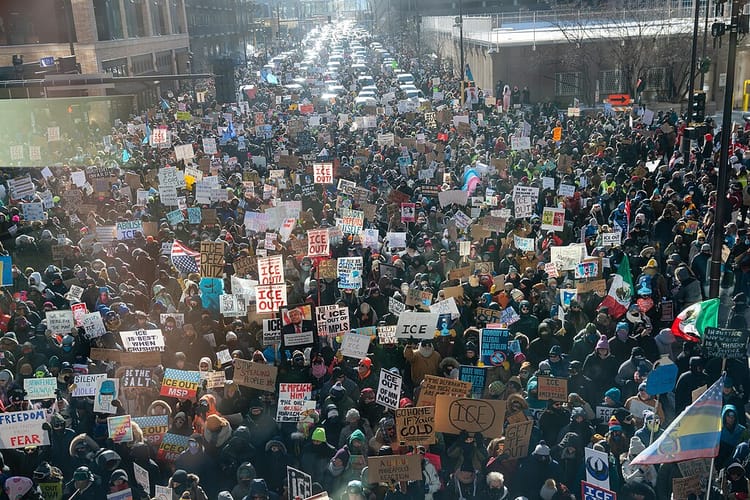On Lobbyists, Civility, and the State of Climate Journalism

The timing of this newsletter is weird because last week I attended the Society of Environmental Journalists conference, where Drilled co-hosted a two-day workshop with Floodlight News on covering climate disinformation. It went well, we had some interesting conversations, and it's always great to hang out with other climate reporters and to meet up with sources in person.
It also left me feeling pretty concerned about the state of climate journalism today. I'm going to try to explain and it's probably going to be a bit of a ramble.
The first thing that made me go hmm about this conference was the presence of so many industry lobbyists, crisis comms and public affairs folks. This is not new; SEJ has long had an open policy about allowing representatives of various polluting industries to not just attend its conference but also sponsor booths and meals. One infamous fossil fuel lobbyist, Bracewell's Frank Maisano, sets up a carving board with a giant prime rib on it every year. He brings his clients in, too, selling them access to journalists. Lots of people giggle about it and roll their eyes at ol' Frank as though he's just sort of a wacky uncle. He's an aggressive lobbyist for the largest energy companies in the country, and his sole purpose for schmoozing with environmental journalists is to shape their thinking on energy and environmental policy, maybe convince them they're "biased" if they write about LNG as anything but a climate solution.
I'm not necessarily advocating for SEJ to cut off his or other industry representatives' access to their membership, but I do think they need to help their journalist members understand what exactly they're dealing with here. If you're going to let the fox into the henhouse, maybe give the hens a heads-up.
I also find it a bit shocking that journalists need to be told this in the first place, or encouraged to treat such folks with the suspicion they have earned. Why have we drunk the civility Kool-Aid so completely? And listen. Listen. I am an exceedingly polite person. There is a difference between being polite and being a pushover. No one needs to thank someone for lying to them and ask for more, and that goes double for journalists.
At a workshop on covering plastics, the president of America's Plastic Makers, a division of the American Chemistry Council, spoke about the need for creating a "circular economy" on plastic, underscoring the (false) idea that recycling can solve all the problems with plastic. Just so we're clear: Recycling of plastic has never even made it into the double digits, and the industry never expected it to. I didn't attend, but I ran into one of the moderators, Sharon Lerner, a tremendous reporter at ProPublica (previously at The Intercept) on everything from plastic to chemicals to oil, in the hall and she made a great point: "It's okay that he's here, I just don't understand why all these reporters feel compelled to be so polite to him." It's important for reporters to hear how the industry messages around such things, but it's even more important that they see their colleagues push back on that messaging, press for details, and ask the hard questions. None of which is "rude"!
In my own workshop, a reporter wondered if we weren't expanding the definition of "disinformation" a bit too far, given that we were including things he might classify as just "regular advocacy." This came up a few times and my favorite response to it came from Phil Newell, director of science defense for Climate Nexus, who said that to qualify as disinformation something needed to be "wrong, on purpose, for money." Simple! The normalization of lying as "just political advocacy"—which happens to be the argument oil companies are making about climate denial in the courts at the moment, that if it was done in service of shaping policy, it's political advocacy and therefore protected—is, in my opinion, a big problem in American society in general and something that journalists should be questioning, not upholding.
But advocacy flows both ways, and I think journalists would do well to remember that, too. Several years ago, I had a conversation with Rutgers media studies professor Melissa Aronczyk that really stuck with me. She pointed out that today, everyone uses PR tactics and strategies to try to shape how the public understands certain issues and that while corporations and industry groups have a clear profit motive for using these tactics in order to avoid regulation or litigation, it isn't necessarily better when it's coming from people you agree with. The warping of the information ecosystem is the problem, in other words, and you're either trying to combat that problem, or you're leveraging it to get your own views across. Which is not meant as a judgement: not everyone is going to see the warped information ecosystem as a top-priority problem. I do, though, and I think more journalists should. Something that happened in our workshop reinforced that opinion.
Journalism conferences are often dominated by theoretical conversations and we wanted to get into the nuts and bolts of how stories about climate disinformation come together. So, we asked 10 reporters to present stories and walk us through how they decided to cover this thing, how they reported it out, what the challenges were, and what the response or result was. More than half had a similar story: This nonprofit pitched me the story and sent me documents, then I did a little more reporting to flesh it out, and voila, a story. In one case, the reporter didn't disclose this in their presentation, but used phrases like "in documents we saw," so I looked into it and sure enough that's what happened there too. [If you're ever reading a story and it includes the lines "according to documents seen by" or "in documents shared with", "in emails seen by," – the reporter was pitched that story and handed those documents.] I brought it up at the next day's workshop and some folks got quite defensive, so I'll try to explain why this practice concerns me. It's not because I think anyone on either side of this equation is a bad person or bad at their job; my focus is journalism, so my concern here is that journalists need to remember what our role in society is supposed to be, and who we ultimately work for: the public.
That's different from campaigners or nonprofit researchers, which is why we need both. One panelist explained that they had gotten documents and put together a big scoop and pitched it to multiple papers, all of which had run the story on their front page the same day. "Reporters could never have done that, I'm sorry," he said. Yes, exactly! That's not our job. We're not campaigners. Nor are we appendages of campaigns, receptacles of information, or disembodied platforms waiting to be leveraged. At least we shouldn't be. And don't get me wrong: I'm not advocating for a journalism divorced of reality, a blind devotion to "objectivity," or a dissemination of facts devoid of any concern about the fate of our planet, species, and society. In my opinion, journalists' obligation is to the public interest, and to adequately serve the public's interests we can't wait around for other people to tell us what's important or who to look into, we can't become willing victims to and participants in the warped information ecosystem, we must fight off the (very understandable!) desire to give up on being enterprising, what with so much to cover and so few of us, not to mention so little job security or financial stability.
And frankly, if Drilled can do it, all the outlets with three times our staff and resources can too. By "it" I don't mean avoid nonprofits or never take pitches, just be a little more enterprising. Come up with your own ideas, do research that no one wants you to do or cares if you do because sometimes that digs up the most surprising (and impactful!) findings, keep a list of people and organizations of interest, get out the red thread and connect some dots, file your own FOIAs (freedom of information act requests) and make a bunch of mistakes that you learn from. I've been doing this for 20 years and still occasionally get my ass handed to me by a salty public information officer for filing too vague a request—I love it, it's how I continue to learn and, hopefully, improve.
We get pitched stuff too, and go to nonprofit researchers to vet or check things, or for help with tricky FOIAs all the time; they are an indispensable resource and many of them were doing this research when no reporters were even willing to look into it. What were they to do, wait for us to get it together? Of course not! And when reporters are just starting out, or are new to the climate beat (and particularly the climate disinformation beat) they may need more suggestions and handholding; there are many ways in which the relationship between reporters and nonprofit researchers can be quite collaborative and healthy.
It mostly hinges on the power of information and how it's wielded: is information being shared freely or is someone acting as a sort of gatekeeper of valuable documents and sources? Are they trying to keep you from doing your own research? Are they pressuring you to tell a particular story or to publish it at a particular time, and is the access they've given you (to a source, documents, an idea) being used to apply that pressure? Again, I don't think there's anything particularly wrong with this behavior, what I'm advocating for is that journalists remember what our job is and stop ceding power entirely to everyone else's agenda.
To do that, of course, we need support, not just financially (although god yes, that) but also socially. Journalists have become easy pawns in the information war because our lives are in such total freefall. We are constantly being attacked from all sides; just a few years ago, the president of the U.S. called us "enemies of the state." That became a huge joke, but it also gave people carte blanche to be giant assholes to us in public. If you've never been spit on by a stranger for honestly answering the question "what do you do?", I don't recommend it. We are surveilled and followed, we get a steady stream of hate mail and vitriol (that goes double or triple for women), and we also receive constant criticism from campaigners for not doing enough. At the same time, I don't know anyone who knows with any level of certainty how long they'll be able to afford being a reporter. No one knows how long their job will last, or when the rug will be pulled out from under them. All of us spend a significant amount of time justifying the existence of our profession, usually to people who have absolutely no understanding of what we do. Researchers deal with a lot of those problems, too, I just don't think any job is quite as underpaid and precarious these days as "journalist."
At various points throughout our workshop, campaigners, advocates and academics underscored how much they need journalists – by which they meant mostly "we need you as mouthpieces for what we want to say" or "we need you to get the word out and amplify our research" or sometimes "we need you to translate our research, and explain to the public why it's important." All totally valid, but journalists need to remember that we also have value beyond being megaphones for others; the public also needs us, and sometimes they need us to have our own ideas and be capable of finding and sharing important truths ourselves.
Yesterday I was doing a training for some folks who do a lot of great climate storytelling and want to make sure their research is solid. I walked them through how a story we're about to put out came together, from the initial idea (I just thought it was weird that a particular media entity's approach to nature seemed to map so perfectly to the fossil fuel industry's) to digging through an academic archive, then a corporate archive, then filing multiple FOIAs, then combing through the Wayback Machine, then doing a bit of LinkedIn sleuthing (it's true--LinkedIn is a highly underrated reporting tool!), then looking for court documents in Pacer, then connecting with sources, then cold-calling random employees to get someone, anyone to comment because the PR people were stonewalling and we really hate to include the line "did not respond to requests for comment" in a story, then footnoting the draft to send to our fact-checker, then going through a second round of fact-checking, then having our lawyer review it. All in, from idea to story, it took three years. I think it was worth it. Every person I mention it to has that look on their face that people get when you just blew up something they thought was true or exposed something they thought was pure and good as corrupt; those are generally the stories that wind up changing things. But I wasn't sure it would pan out when we started, and I still won't know until it's out in the world. It's so hard to predict these things; so often, the stories I think are just repeating something we've already covered are the ones that strike a nerve. Which is why we're usually running at least half a dozen investigations and working on a dozen stories at once.
That's how it works at most investigative outlets, and it's a mismatch for both the current business model of media and the funding approach of philanthropy; it doesn't map to neat and tidy timelines, or guarantee impact X for funding Y. Unfortunately it's a perfect match for the role journalism is supposed to play in society. And honestly I don't know what we do about that.

Latest Climate Must-Reads
- [ICYMI] Fake supporters welcome climate change denialist to Africa Energy Week in Cape Town, by Kristin Engel for The Daily Maverick — This story came out last fall, but a lot of people missed it. When Alex Epstein (of The Moral Case for Fossil Fuels fame) went to Cape Town for Africa Energy Week, he didn't want to leave his reputation as the self-appointed energy savior of Africa to chance, so he hired locals to hold signs that read alternately "Welcome Alex Epstein" and "Invest in African Energy Now." Among the many funny things about this story is that the signs are so obviously manufactured: two repeating slogans, all in black typeface on white posterboard:

- Lithium Companies Fight Over Water in the Arid Great Basin, by Daniel Rothberg for Inside Climate News - A terrific story looking at a key battle in domestic lithium supply in the U.S. (in Nevada, the only state with an active lithium mine in the country).
- There's An Explosion of Plastic Waste. Big Companies Say 'We've Got This', by Hiroko Tabuchi for The New York Times - On the boondoggle that is "advanced recycling."
- European Court Rules Failure to Cut Greenhouse Gases Violates Citizens' Rights, by Alice Hancock for the FT - In a landmark decision on the so-called "Swiss grannies" case, Europe's top human rights court ruled that the government of Switzerland failed to protect citizens from the “serious adverse effects of climate change on lives, health, wellbeing and quality of life” by not meeting its own climate targets.
- The Brazilian Special Forces Unit Fighting to Save the Amazon, by Jon Lee Anderson for The New Yorker - We've grown accustomed to seeing camou-wrapped men with guns terrorizing Indigenous environmental activists, so this story about special forces troops trained to help them protect the Amazon is fascinating.





